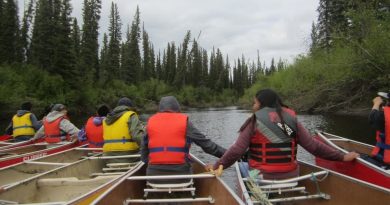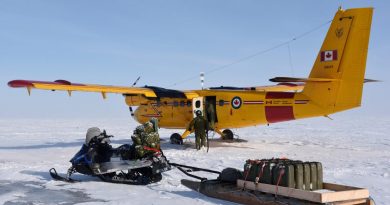Learn About North in the North, say Canadian Arctic University Proponents
People who support the idea of a university in Canada’s North met in Yellowknife this week to discuss how to go about establishing such an institution.
A pan-northern working group met in the Northwest Territories’ capital for a three-day “made in the North” workshop set up by the Walter and Duncan Gordon Foundation, a national public policy foundation.
Canada is the only Arctic country without a university based north of 60, meaning many students from the three territories leave home to pursue university studies.
“Young people are saying, ‘Why is it that we have to go to the South in Canada to learn about the North and northern public policy and so on, when [in] every other country you learn about the North in the North?'” foundation vice-president James Stauch told CBC News as the workshop wrapped up Thursday.
3 colleges exist
There are 52 northern universities in the world’s eight circumpolar nations, with an average of seven universities in each northern country. However, there is none in Canada, Stauch said.
While each of Canada’s territories has a college — Nunavut Arctic College, Yukon College, and Aurora College in the Northwest Territories — they provide only a limited number of degree programs in conjunction with universities elsewhere.
The working group consisted of representatives from the foundation, colleges and First Nations, as well as grassroots groups that have formed in the past few years to push for a northern university.
“People that work in education really see this thing very clearly happening over a period of time,” said Chief Joe Linklater of the Vuntut Gwitchin First Nation in Old Crow, Yukon.
“We chose the notion of maybe 25 years to have a fully functioning institution, and some of the existing institutions — the colleges — say that they can see it happening a lot quicker than that.”
Linklater said the next step should be to get direction from communities around the North on how to set up a pan-territorial, post-secondary institution.
Workshop participants agreed that a northern university should not be centralized in one location, but instead have campuses spread out to serve the entire region.
Delegates said a pan-northern university would rely on digital technology, such as video conferencing, to allow people to study closer to home.
Emphasis on aboriginal knowledge
Participants in this week’s workshop said they believe students can learn about Arctic sovereignty, climate change and aboriginal studies first-hand in Canada’s North.
Aurora College president Sarah Wright-Cardinal said northern Canadians don’t realize how much knowledge they have to offer.
“I was recently at University of Alaska [and] they’ve developed a fourth-year undergraduate studies course on land claims, and it’s based on our land claims,” Wright-Cardinal said.
Another participant, Catherine Cockney of Inuvik, N.W.T., said it was difficult to leave her home and family when she left the territory to pursue her university studies.
While a formal education is important, Cockney said it’s not what inspires her vision for a university in Canada’s North.
“The emphasis would be [on] the history of the North, the aboriginal people and our knowledge,” she said.
On Thursday, the working group released its vision statement: “As northern peoples of Canada, we envision in our homelands a renowned institution centred on the teachings of the land, led by the wisdom of indigenous peoples, fostering innovation, dialogue and inspired communities.”



